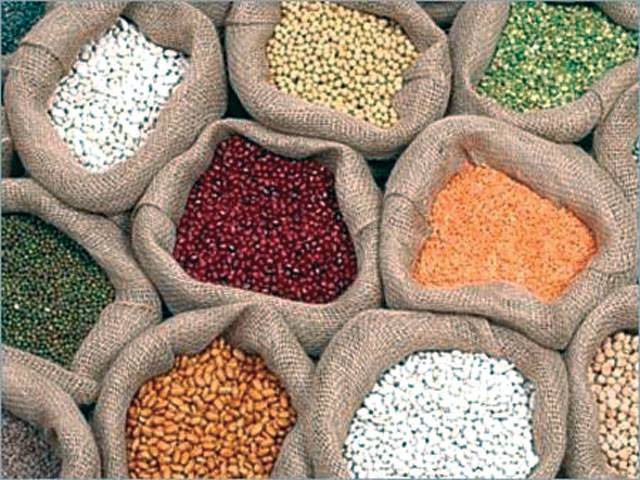LAHORE - Huge losses caused to the farmers almost doubled the rates of pulses during the last one year, with up to 40 percent increase recorded during the last month alone.
According to market sources, the pulses, being the most sensitive crop, were hit hard by erratic weather, as this year, in January, 50 percent less rains were recorded, while, in February, over 65 percent less rains were received. Similarly, 30 percent more rains were received in March, affecting the pulse crops significantly.
The ‘maash’ price has now crossed Rs300 per kg mark; ‘moong’s’ market price is beyond Rs160 per kg, while lentil’s price has gone up to Rs150 per kg.
According to market reports, the price of white grams has shot up to Rs145, while rates of black grams have skyrocketed to Rs160 per kg, and that too, ahead of the holy month of Ramadan.
Masoor is being sold at Rs 150 per kg, white lobia is available at Rs120 per kg while red and black lobia are being sold in the range of Rs120-140 per kg.
The prices of most of the items of daily use, including tea, fresh vegetables and fruits are stable or have shown a decline.
According to the sources, absolute dependence on imports, inadequate harvest owing to erratic weather and hoarding by middlemen sent the pulses’ prices skyrocketing during the last one year.
They said that 50,000 tonnes of ‘mash’ was being imported for the last many years, and its consumption was over 75,000 tonnes. Same is the case with lentil, which is only 10,000 tonnes produced locally against a requirement of 90,000 tonnes.
In retail market, high quality rice is being sold at Rs130, while that of low quality at Rs90 per kg. The price of broken rice is Rs70 per kg.
Sugar is being sold at Rs65 per kg, while‘Beisan’ at Rs130 per/kg.
Similarly, a drop has been witnessed in the rates of several fruit items in the wholesale and retail markets.
Peach price witnessed a decline of Rs50 per kg: from Rs130 per kg to Rs80 per kg; watermelon’s price dropped from Rs25 per kg to Rs20 per kg; normal quality local banana’s rate plunged from Rs80 per dozen to Rs60 per dozen, while fine quality local banana’s price dipped from Rs120 per dozen to Rs 100 per dozen.
Similarly, Indian banana is still being sold at Rs150 per dozen; best quality apples are being sold at Rs150 per kg; Iranian apples at Rs120 per kg, while normal quality local apple is available in the range of Rs60 per kg to Rs100 per kg.
Guava’s price stands at Rs80 per kg; strawberry is being sold in the range of Rs150 per kg to Rs200 per kg; cherry at Rs300 per kg pack.
In the same way, vegetable prices have also gone down: tomato is being sold at Rs20 per kilogram, while the rate of ginger has also decreased to Rs80-120 per kilogram; garlic is available at Rs120 per kilogram; high quality onion is available at Rs30/kg; green chilly is being sold at Rs70 per kilogram.
However, the price of cauliflower increased to Rs40 per kilogram; ladyfinger to Rs60 per kg; ‘shimla mirch’ is available at Rs80 per kg; cabbage at Rs70 per kg; peas at Rs80 per kg, ‘Arvi’ at Rs80 per kg; cauliflower at Rs50 per kg; ‘brinjal at Rs40 per kg; bitter gourd at Rs70 per kg, and turnip at Rs60 per kg.
The price of potatoes is stable, which now is available at Rs20 per kg; spinach being sold at Rs10 per kg; lemon’s price has jumped to Rs 250 per kg; ‘mathi’ bundle is available at Rs10; turnip at Rs30; cucumber is being sold in the range of Rs25-30 per kg.
There is no change in the prices of beef and mutton, as boneless beef is being sold at Rs450 per kg and mixed beef at Rs250 per kg, while the price of mutton stands at Rs750 per kg.
There is no change in the prices of different brands of ghee/cooking oil as Dalda, Habib and other good quality cooking oil/ghee is available at Rs800 per 5 kg; sugar price is stable and is being sold at Rs65 per kg; Lipton Yellow Label (one kg packet) is available at Rs650; eggs at Rs76 per dozen, while wheat flour’s per 20 kg bag is available in the range of Rs750-760 per kg in the market.






